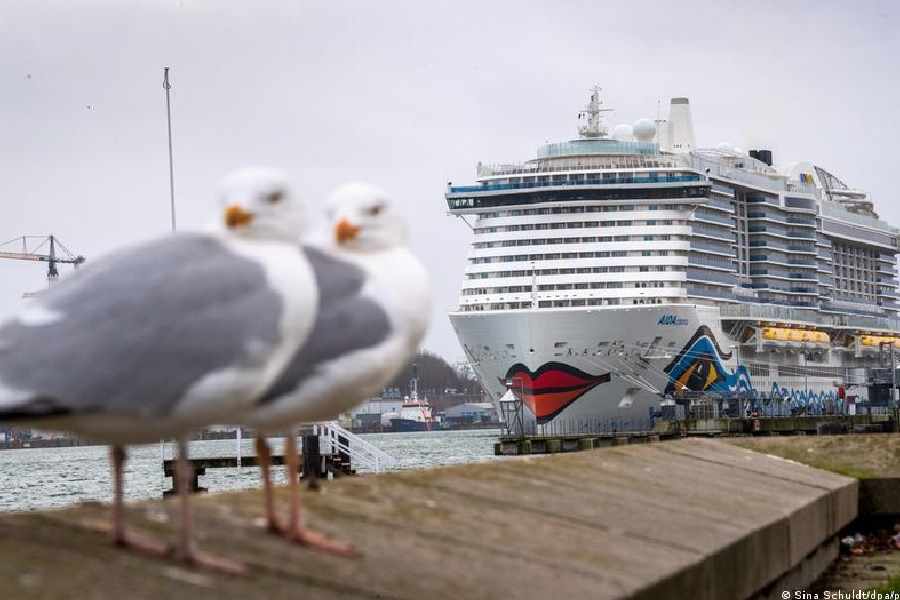When the 6,327-passenger cruise ship MSC Euribia took a four-day journey from Saint-Nazaire, France to Copenhagen last summer, MSC Cruises celebrated it as "the world's first net zero-greenhouse gas emission cruise."
The Swiss company had dug deep into their pockets to finance the 400 tons of bio-liquefied natural gas for this highly publicized voyage.
"This industry's first climate-neutral cruise marks another important step on our path to zero emissions," said Pierfrancesco Vago, executive chairman of the MSC Group's cruise division.
But was it really a sign of more environmentally-friendly times to come in the cruise industry or an expensive publicity stunt?
MSC has promised to be completely carbon-neutral by 2050. This target puts the shipping company in line with the International Maritime Organization (IMO) and Cruise Lines International Association (CLIA), which have also set 2050 as their climate-neutral date.
However, it remains unclear how this goal will actually be reached. In its recent sustainability report, for example, MSC Cruises goes into detail describing the efforts it's making to reduce greenhouse gas emissions, but precise targets for the next few years are nowhere to be found.
TUI Cruises is a little more specific. The cruise company aims to offer its first climate-neutral cruises in 2030 and will reduce total CO2 emissions by 27.5% compared to 2019.
A new vessel, Mein Schiff 7, is expected to set sail this June and will eventually run on green methanol produced from renewable energy. Although the ship's propulsion system will still not be emissions-free, its carbon footprint will, however, be neutral.
However, the industry as a whole has not laid out a framework for how to become emissions-free.
For example, TUI Cruises has not set a deadline for phasing out heavy fuel oil, which is particularly harmful to the environment. Nor has it set a date by which the existing fleet is to be converted to more environmentally friendly types of propulsion. "This is due to technical feasibility and the availability of alternative fuels," says company's spokesperson Lars Nielsen. He points out that it doesn't make sense to name a target date without knowing when sufficient alternative fuels will be available.
Indeed, how the industry's growing demand for e-fuels — renewable fuels of non-biological origin — will be met remains unclear. "Currently, e-fuels are not being produced commercially and most of the plants announced by 2035 don't have secure financing," says Environmental Action Germany (Deutsche Umwelthilfe). "The amount produced could not even replace 2% of the global shipping industry's fossil fuel consumption."
According to the NGO, TUI Cruises advertising net zero cruises without providing details as to how they will actually make them net zero amounts to "greenwashing" and "consumer deception." Environmental Action Agency recently filed a lawsuit against the company.
Sönke Diesener from the Nature and Biodiversity Conservation Union (NABU), also believes that cruise companies companies could do more. The fact that the industry still relies on heavy fuel oil, for example, is simply because industry players don't want to spend more money. There are already fuel alternatives on the market which are less less-harmful to the environment than heavy fuel oil.
"The industry is really making itself look bad," says Diesener, noting that cruise companies are still commissioning vessels that run on heavy fuel oil.
Diesener says the cruise industry needs to provide details about how it intends to achieve climate neutrality by 2050. If the industry made a clear statement that only climate-friendly fuels will be used in the foreseeable future, it would send a signal of interest to companies manufacturing alternative fuels.
Some shipping companies are making plans to cooperate with energy companies and drive forward the development of alternative fuels.
TUI Cruises, for example, recently signed a memorandum of understanding with Hamburg-based company Mabanaft which will eventually supply their vessels with synthetic e-methanol.
Oleksandr Siromakha, head of sustainable fuels at Mabanaft, explained why progress seems to be made slowly.
"If you order a new cruise ship that is designed to run on methanol, then you also want to be sure that the methanol will be available in sufficient quantities," he points out. "Methanol producers, on the other hand, say 'how are we supposed to make a decision to invest if these ships don't even exist yet?" Siromakha calls on politicians to lay out a clear framework to help facilitate this transition.
Perhaps recent EU pressure will have help the shipping industry reduce its CO2 emissions.
At the start of 2024, the EU recently included shipping, meaning all intra-European shipping and 50% of extra-European voyages, in the EU Emissions Trading System (ETS). This means greenhouse gas emissions of fuels used in the industry will not be able to exceed certain quotas. The EU also stated that onshore electricity will become mandatory in European ports by 2030.
Meanwhile, it remains unclear when the next zero-emission cruise will set sail at MSC Cruises. "We need more renewable fuels available for the entire shipping industry before we can repeat this achievement," says Michele Francioni, senior vice-president of optimization for the cruise division of the MSC Group.
And so, the MSC Euribia continues to sail with liquefied natural gas and is likely to do so for the foreseeable future.










